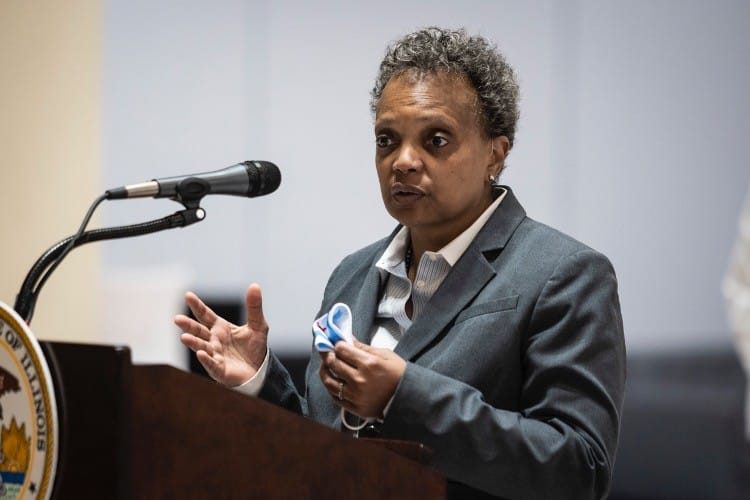
Chicago Democrat Mayor Lori Lightfoot on Thursday declared systemic racism a public health crisis in her city, saying disparities among the races in access to effective and affordable health care, as well as the impact of racism on the mental health of people of color, and the subsequent difference in life expectancy “is literally killing us.”
“At almost every point in our city’s history, sadly, racism has taken a devastating toll on the health and well-being of our residents of color, and particularly those who are black,” Lightfoot said. “Without formally acknowledging this history and reality, and the continuing impact of that infamous legacy, looking at the root causes of today’s challenges, we will never be able to move forward as a city and fully provide our communities with the resources that we need to live happy, vibrant, and fulfilled lives.”
To defend her argument, Lightfoot, the city’s first black and openly lesbian woman mayor, told a tear-jerking story about her parents, who grew up in the segregated Deep South. According to Lightfoot, both were unable to realize their dreams or fulfilling careers largely owing to “racist attitudes in the 1920s.”
Fast forward to today, a century later and in a state way up north, Lightfoot claimed the same experiences exist “for far too many Black residents and residents of color in our city.”
The mayor suggested that over the past 15 months, the COVID-19 pandemic has underscored racial health disparities in Chicago.
“COVID laid bare a lot of disparities. When we started looking at the disproportionate impact of COVID on communities of color in particular, there’s a straight line to the lack of access to safe, affordable, high-quality healthcare,” she said.
According to Lightfoot, COVID-19 death rates among black residents are more than double those of white residents, and the Latinx death rate exceeds the White death rate by 76 percent.
In addition, racism, as a “public health crisis,” has taken a toll on the health of non-white Chicago residents. Chicago Department of Public Health Commissioner Dr. Allison Arwady cited stats from the recently released health report indicating black Chicagoans are more likely to suffer from different kinds of diseases, and have a shorter life expectancy than their non-black neighbors.
To address the disparities, the mayor announced that the city would spend nearly $10 million in coronavirus relief funds from the Centers for Disease Control and Prevention (CDC) on an “anti-racism effort.” As a part of the effort, the city will launch the Healthy Chicago Equity Zones — six geographic areas covering the entire city. Community groups in each of those six areas of the city will lead efforts to come up with targeted strategies to improve community wellness. Ayesha Jaco, executive director of West Side United, said the goal is to decrease the life expectancy gap between the Loop and West Side — which currently stands at 14 years — by half by 2030.
Neither official specified the causes and symptoms of a “racist” disease, or whom it affects, or how it is spread. Nor did they recommend any treatments other than “acknowledging the history and reality” of it, or spending $10 million on “equity zones,” a term used to discriminate against people of “unfavorable” — non-black — races.
Although city officials may be shifting the focus to “systemic racism,” it appears the single most significant health crisis facing Chicago residents is gun violence. As of today, 300 people have been murdered and 1,587 shot in Chicago since January 2021, and the trend goes upward. Shootings occur in mostly black neighborhoods.
Despite having some of the toughest gun laws in the nation, Lightfoot blames illegal guns, and acknowledges that “We are part of a club of cities for which no one wants to belong, cities with mass shootings.” Lightfoot fails to acknowledge her own incompetence in addressing the issue, and beseeches the federal government to come help her run the city while declaring: “This is a national problem.”
Labeled one of the most dangerous cities in America, Chicago has long been under Democratic policies. The Windy City hasn’t seen a Republican mayor since 1931. For the last two decades, Illinois has been almost exclusively run by the Democrats, and is considered one of the “big three” Democratic strongholds alongside California and New York. All state executive offices and both state legislative branches are held by Democrats. After earning statehood in 1818, Illinois voted mostly Republican until the 1920s and then voted primarily Democratic through the Great Depression and World War II. Illinois began voting Republican again until 1992 and then voted Democratic in every election since. If there is indeed a “legacy of racism” that manifests itself in high levels of diseases and mortality in the black community, then Chicagoans have no one to blame but those whom they’ve been electing for a long, long time.




